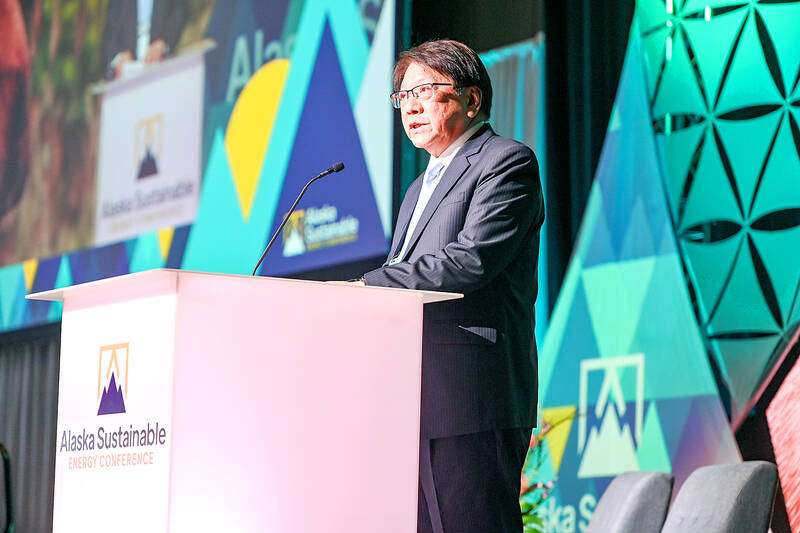The secretary-general of the Presidential Office heading a delegation to the US highlights the importance President William Lai (賴清德) attaches to the visit, the strategic plans behind proposed investments and an attempt to deepen US-Taiwan ties, a Presidential Office source said on Monday.
Taiwan in March signed a letter of intent with the US on investing in natural gas extraction in Alaska, which, coupled with Lai’s statement that securing Taiwan’s energy supply through US purchases, highlights the prominence the president regards such issues, the source said.
Presidential Office Secretary-General Pan Men-an (潘孟安) last week attended the Alaska Sustainable Energy Conference.

Photo courtesy of the Presidential Office
Pan told the conference in a speech that Taiwan is a responsible member of the international community, able and willing to contribute to the development of artificial intelligence and the reindustrialization of the US.
Prior to his departure for the US, Pan was told by Lai to “establish efficient channels of negotiations while upholding Taiwan’s national interests,” the source said.
It is rare for the Presidential Office’s secretary-general to head a delegation on behalf of the president or the government, they said.
Coupled with the attendance of Japanese Vice Minister for International Affairs Matsuo Takehiko and South Korean Vice Minister of Trade, Industry and Energy Lee Ho-hyeon, Lai tapping Pan to head the delegation underscored the president’s emphasis on the conference, the source said.
A high-profile reception for the Taiwanese delegation — attended by US Secretary of Energy Chris Wright, US Secretary of the Interior Doug Burgum, US Environmental Protection Agency Administrator Lee Zeldin, Alaska Governor Mike Dunleavy and US Senator Dan Sullivan — indicated Washington’s interest in pursuing collaborations, the source added.
The collaboration to extract natural gas in Alaska shows that Taiwan, the US, Japan and South Korea are seeking to enhance the security, peace and stability in the first island chain by stepping up energy partnerships, they added.

Chinese spouse and influencer Guan Guan’s (關關) residency permit has been revoked for repeatedly posting pro-China videos that threaten national security, the National Immigration Agency confirmed today. Guan Guan has said many controversial statements in her videos posted to Douyin (抖音), including “the red flag will soon be painted all over Taiwan” and “Taiwan is an inseparable part of China,” and expressing hope for expedited reunification. The agency last year received multiple reports alleging that Guan Guan had advocated for armed reunification. After verifying the reports, the agency last month issued a notice requiring her to appear and explain her actions. Guan

The Kaohsiung Tourism Bureau audited six hotels in an effort to prevent price gouging ahead of Korean band BTS’ concert tour in the city scheduled for Nov. 19, 21 and 22 this year. The bureau on Friday said that the audits — conducted in response to allegations of unfair pricing posted on social media — found no wrongdoing. These establishments included the local branches of Chateau de Chine, Hotel Nikko, My Humble House, and Grand Hai Lai, it said, adding that the Consumer Protection Commission would have penalized price gougers had the accusations been substantiated. The bureau said the Tourism Development Act

GIVE AND TAKE: Blood demand continues to rise each year, while fewer young donors are available due to the nation’s falling birthrate, a doctor said Blood donors can redeem points earned from donations to obtain limited edition Formosan black bear travel mugs, the Kaohsiung Blood Center said yesterday, as it announced a goal of stocking 20,000 units of blood prior to the Lunar New Year. The last month of the lunar year is National Blood Donation Month, when local centers seek to stockpile blood for use during the Lunar New Year holiday. The blood demand in southern Taiwan — including Tainan and Kaohsiung, as well as Chiayi, Pingtung, Penghu and Taitung counties — is about 2,000 units per day, the center said. The donation campaign aims to boost

BACK TO WINTER: A strong continental cold air mass would move south on Tuesday next week, bringing colder temperatures to northern and central Taiwan A tropical depression east of the Philippines could soon be upgraded to be the first tropical storm of this year, the Central Weather Administration (CWA) said yesterday, adding that the next cold air mass is forecast to arrive on Monday next week. CWA forecaster Cheng Jie-ren (鄭傑仁) said the first tropical depression of this year is over waters east of the Philippines, about 1,867km southeast of Oluanpi (鵝鑾鼻), and could strengthen into Tropical Storm Nokaen by early today. The system is moving slowly from northwest to north, and is expected to remain east of the Philippines with little chance of affecting Taiwan,